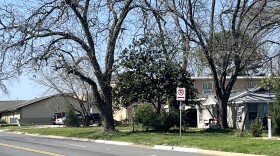For six years, Angel Carter and volunteers that signed up for her annual Fish Creek Cleanup Challenge have cleaned up over 70,000 pounds of trash.
Volunteers’ finds have run the gamut from fast food bags to jet skis, mattresses, microwaves and safes. People dump items they no longer need, and litter from nearby properties finds its way into creeks like the one in Carter’s neighborhood.
“We’re getting a lot less people dumping over here than we had before, but there’s still a lot of washdown and still a lot of people that don’t have the memo yet,” Carter said. “That’s going to happen with any of your creeks.”
Though the demand for litter has remained, Carter said she’s observed a drop in volunteers – especially since the COVID-19 pandemic. Younger volunteers who grew up participating in the challenge have not returned.
“We’re not getting as many in, and I don’t know the reason for that because the need is still there,” she said. “But I noticed that at the food pantries, I noticed that at the community gardens. I noticed it in a lot of places.”
City Manager Trey Yelverton told council members Tuesday evening he’s seen the same issue. The city hosts a bevy of volunteer programs, and Yelverton said the city tends to “love volunteers to death.”
“We get them, we love them, and we use them so much that we burn them out because there’s too much to do,” he said.
Yelverton proposed the formation of a nearly $500,000 Clean Team in the city’s 2025 budget. The four-person group would scout commercial roads and address problems like litter, broken curbs and overgrown weeds before they’re reported to the city.
The effort, he said, would underpin volunteer contributions and the various city departments that address blight and litter. The team would also address problems in parts of town where responsibility for projects is unclear – spaces he describes as “no man’s land.”
Arlington’s code ordinances generally state that surrounding landowners are responsible for their property to the middle of the road. Yelverton said people are less likely to follow through on the ordinance for safety reasons.
“On Cooper Street, cars are zinging by at 50 miles an hour and they’re like, ‘I don’t want to get too close; I’m going to get killed,’” Yelverton said.
While city employees and service providers generally try to address litter, Yelverton said the city can create a team to more efficiently handle problem spots that aren’t necessarily under the purview of departments like code compliance or asset management.
“I just don’t feel like we’ve got a systematic approach to that right now,” Yelverton said during an interview. “It’s very much hit or miss, and people are off doing their primary duties, but they’re not focused on the secondary duty.”
Carter said she did not initially view the proposal as a positive one because it would not touch neighborhood roads. Ultimately, Carter said she believes the team’s work will benefit the whole community – and maybe inspire more volunteers to pitch in.
“When people come here to Arlington, they, much like me, are going to see the trash along (State Highway) 360, along (Interstate 20), along Cooper, along Matlock,” she said.

The Clean Team initiative is among the only significantly new programs proposed in the city’s 2025 budget, Yelverton said. Council members will consider the proposed $722 million budget and a 1-cent property tax increase during a hearing Sept. 10.
Council members Tuesday evening discussed alternatives to spare residents the property tax increase.
Nikkie Hunter, District 3 council member, said she would be in favor of delaying the team until the city could include parks such as Fish Creek in the initiative. She said the city should also focus on expanding volunteer efforts.
“I just feel for half a million dollars, we need to focus on people that want to clean the city for free,” Hunter said. “If they’re wanting to help clean up in places like corridors, if they’re wanting to clean up parks, let’s use that and save half a million dollars.”
Council members discussed partnerships with local businesses and finding ways to get the community involved.
Mauricio Galante, District 1 council member, suggested instituting a fee for commercial property owners to fund the Clean Team.
Mayor Jim Ross shot down the idea.
“Fees are a lack of transparency, and it’s another way of saying tax. That worries me,” Ross said.
This story was updated at 5 p.m. Sept. 10, 2024, to correct the overall city budget amount.
Got a tip? Email Kailey Broussard at kbroussard@kera.org. You can follow Kailey on Twitter @KaileyBroussard.
KERA News is made possible through the generosity of our members. If you find this reporting valuable, consider making a tax-deductible gift today. Thank you.





